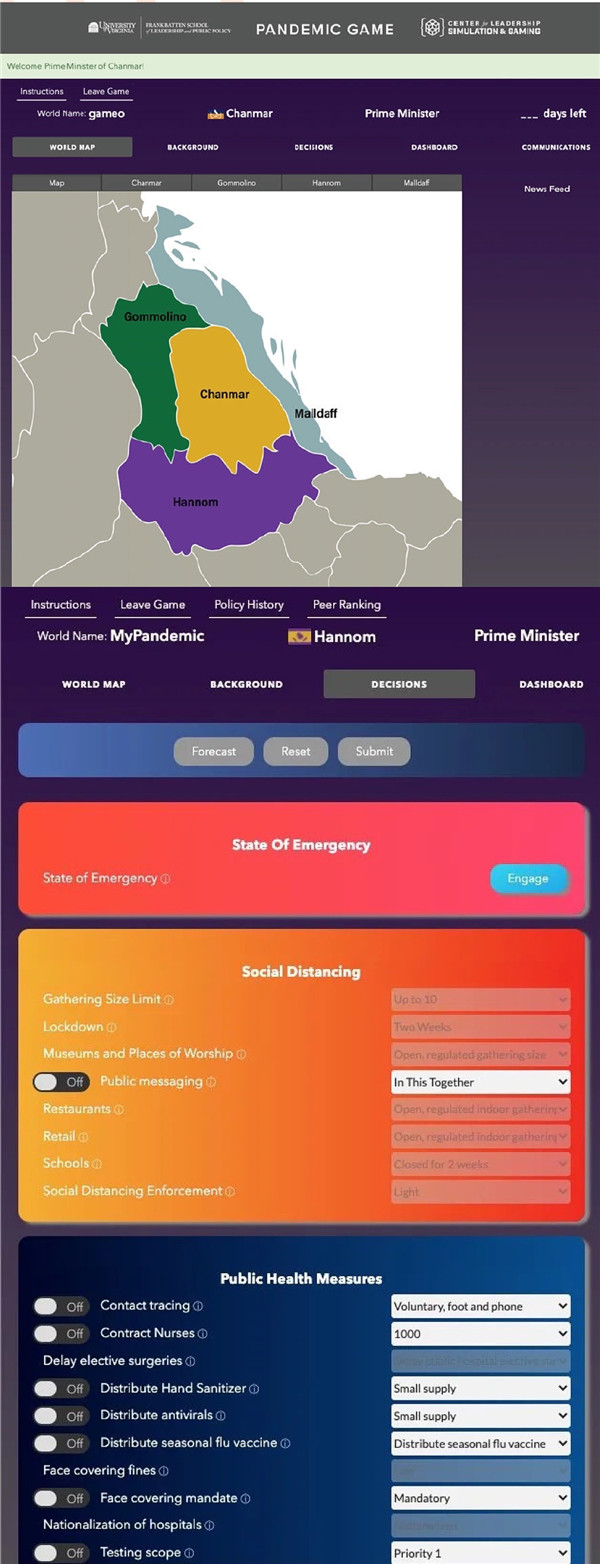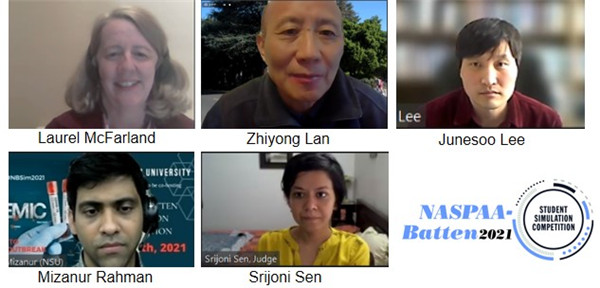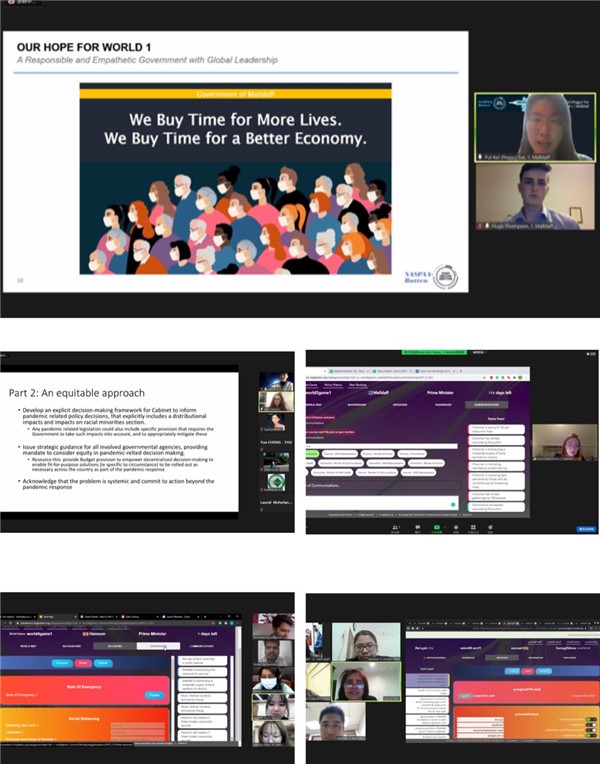On February 27 and March 6, more than 400 graduate students from around the globe competed in a real-time simulation to stop the next infectious disease outbreak during the 2021 NASPAA-Batten Student Simulation Competition. School of Public Policy and Management (SPPM) at Tsinghua University, KDI School of Public Policy and Management (KDIS), North South University (NSU, Bangladesh), National Law School of India University (NLSIU, Bangalore) co-hosted the second day of the competition virtually.
The NASPAA-Batten Student Simulation Competition—a partnership between the University of Virginia Frank Batten School of Leadership and Public Policy and the Network of Schools of Public Policy, Affairs, and Administration (NASPAA)—annually connects public policy students from a vast network of universities worldwide through simulated gameplay.
This year’s simulation focused on the topic of global pandemic crisis management and public health. Developed by experts at the Batten School’s Center for Leadership Simulation and Gaming (CLSG) and backed by real-world data, the Pandemic 2.0 simulation places students in leadership roles within a time-sensitive, fast-paced environment where they must work together to minimize the impact of a deadly infectious disease.

The Pandemic 2.0 Simulation
91 graduate students from 30 universities across 11 countries participated in the competition on March 6. Executive Director Laurel McFarland from NASPAA, Professor Zhiyong Lan from Tsinghua SPPM, Associate Professor Junesoo Lee from KDIS, Senior Lecturer Mizanur Rahman from NSU, and Srijoni Sen from NLSIU served as judges.

Site Judges
In the day-long event, participants were assigned to five simulated worlds. In each world, students were divided into four teams which represented four fictional countries (Chanmar, Gommolino, Hannom, Malldaff). Within each country, participants role-played as the Prime Minister, Minister of Public Health, Minister of Finance, Minister of Communications, and World Health Organization Representative, working with teammates from different universities to navigate difficult policy decisions and their outcomes.Their decisions impacted not only domestic mortality rates, economies, and political situations, but also regional stability. Teams were evaluated on simulation scores, negotiation skills, and presentations made to judges.
At the end of the day, the World 1 Malldaff Team won the regional championship, and the World 3 Malldaff Team became the runner-up. Tse Pui Kei (Peggy) and Hao Zha, students from Tsinghua SPPM, were members of the champion and runner-up teams respectively. Regional winners will compete in a global "All Star" round navigating through the next iteration of the simulation in the coming days.

Tsinghua SPPM’s Participants and Their Global Teammates
“Simulation-based learning is incredibly valuable, as it applies theory to practice, and goes beyond conventional modes of learning,” said NASPAA Simulation Education Director Supriya Golas. “Through these simulations, students can take what they’ve learned in the classrooms and apply it to simulated real-world experiences. We hope these tools will prepare students for the next major global event, whether it’s a pandemic or climate crisis.”
Some SPPM students who joined this year's competition shared their experiences.
Tse Pui Kei (Peggy) 谢珮琪, EMPA Candidate, Class of 2020
Joining the 2021 NASPAA-Batten Simulation Competition on behalf of Tsinghua has given me a timely opportunity to reflect on what I learnt at school and from the actual COVID-19 pandemic. My team and I are honored to be awarded as Champion in the Asia round held on March 6, 2021.
All five members of my team come from different places - China, New Zealand, the United States and Bangladesh. We benefitted from the wide range of pandemic responses used in our home countries and based on these knowledge, together we devised an optimal strategy for the competition.
Teamwork and communication skills have significantly helped my team at the competition, which was held completely online. With healthy debates, we updated our decisions quickly to cope with changes in the simulation rounds. This is an important takeaway for us as aspiring future public sector leaders.
Hao Zha 查皓, MPP-SDG Candidate, Class of 2019
The simulation competition impressed me with the dilemma faced by the government, which is the tough trade off between epidemic control and economic recovery. Besides, there was a darkest period when we had enacted all possible policies to prevent the spread of epidemic and stimulate the economy, but the total deaths kept increasing and the economy got worse. As a prime minister then, I felt extremely helpless and my only hope was that the vaccine could be developed ASAP. This bitter experience informed me of the significance of vaccination for saving people and the world from epidemic.
Haiming Wu 吴海铭, MPP-SDG Candidate, Class of 2019
Different from others, NASPAA-Batten Simulation Competition is a special contest based on simulation and random grouping, which offers public policy students practical opportunities to be the national-level decision makers for simulated countries. Closer to our daily life than ever, this year’s topic is centered around pandemic. The theoretical model of "Impossible Triangle" that I used to learn from papers has been demonstrated vividly this time in the simulation - how to balance the support rate, the economic growth and the public health at the emergency time. Though enjoying making decisions at the macro level, we have been nervous throughout the competition since each and every minor policy change may cause drastic influence on the data which implies national stability and prosperity. From my perspective, comprehensive decision making not only calls for professional knowledge and experience in specific areas, but also involves the wisdom of bargaining and negotiation among departments and among professionals with diversified cultural and academic backgrounds. Thanks NASPAA and Tsinghua University for offering this fantastic opportunity of "learning from doing".
Anne-Sofie Meyer Nissen, MPP-SDG Candidate, Class of 2020
I am grateful for the memorable experience of working in a dynamic, international and engaging conference. My views were challenged in a constructive manner as we all sought collaboration and understanding towards a common goal.
About NASPAA: The Network of Schools of Public Policy, Affairs, and Administration or NASPAA is the global standard in public service education. It is the membership organization of graduate education programs in public policy, public affairs, public administration, and public & nonprofit management. Its over 300 members - located across the U.S. and in 24 countries around the globe - award MPA, MPP, MPAff, and similar degrees. NASPAA is the recognized global accreditor of master’s degree programs in these fields.
About the CLSG: The University of Virginia’s Center for Leadership Simulation and Gaming at the Frank Batten School of Leadership and Public Policy prepares students for public life by allowing them to test real-world solutions in a virtual environment. The CLSG designs, develops and implements cutting edge simulations and experiments to advance education in leadership and public policy; conducts rigorous leadership and public policy research using simulations and experiments; and creates a community of scholarship where faculty, researchers and students are supported in their scholarly efforts related to the methodology of simulations and experiments.

